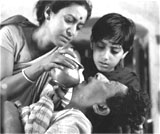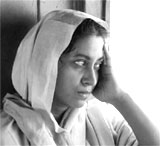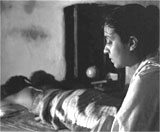

|
Aparajito (1956, India) (aka
The Unvanquished) (Apu Trilogy 2)
In legendary Indian director Satyajit Ray's humanistic
and evocative dramatic follow-up film to the first film in the "Apu
Trilogy" - Pather Panchali (1955), that was followed
by The World of Apu (1959) (aka Apur Sansar); the trilogy of films was based upon
the novels of early 20th century Bengali author Bibhutibhushan Bandyopadhya;
in particular, this episodic film explored the issue of a teenaged
adolescent growing up, coming-of-age, and leaving home for adventure
and independence, and the ensuing effects upon a mother-son bond:
- in the previous film, 10 year-old Apu (Subir Banerjee)
was living with his Brahmin priest-father Harihar Ray (Kanu Bannerjee)
and mother Sarbojaya Ray (Karuna Bannerjee) in a bamboo forest,
under difficult conditions, especially after the death of Apu's sister
- in 1920, the family - with their 10 year-old son
Apu (Pinaki Sengupta as youth) (nicknamed 'Khoka') moved from their "ancestral
home" by train to the holy Indian city of Benares (aka Varanasi
or Kashi) on the banks of the Ganges River with its steep steps-ghats
leading down to the water; the film opened with early
morning sequences of ritualistic Indians bathing and scrubbing
clothes in the holy river to purify themselves; Apu's priest-father
sang and recited holy Hindu scriptures for worshippers as the family's
only income, while his overworked mother tended to house duties
- there was no school for Apu to attend, so he joined
others each day to run through the narrow passageways while playing
with other street kids

Harihar Ray (Kanu Bannerjee)
|

Sarbojaya Ray (Karuna Bannerjee)
|

Apu Ray (Pinaki Sengupta as youth)
|
- struggling with poverty and harsh conditions,
Harihar suddenly and mysteriously fell feverish and ill; his own
home herbal remedies only worked temporarily to improve his respiratory
health; he was further sickened by fireworks' fumes during the
Kali puja festival of lights taking place outside over the span
of a few days; while climbing the steep ghat stone steps in the
heat of the morning, he collapsed and fell down unconscious; he
was brought back to his home where he was cared for, but never
recovered (metaphorically, the release of his spirit was
metaphorically symbolized by a flock
of startled pigeons taking flight)

Hari Sickened by Fumes of Fireworks Outside
|

Hari Collapsing Unconscious on the Steep Stone Steps of the Ghats
|

Sarbojaya Caring For Her Sick Husband
|

Hari in Bed Before His Death
|

Moment of Hari's Death
|

Metaphoric Flight of Birds Representing His Spirit
|
- it was now to be assumed that Apu - as
a Brahmin boy, would become an apprentice priest; however, there
was no longer any means of financial support for the family, although
Apu's prideful mother briefly served as a maid and cooked
for a wealthy Bengali family, who would soon be moving to Dewanpur

Sarbojaya On the Train to the Village with Apu
|

With Her Son Apu Upon Arrival in the Small Village
|
- after a short period of indecision,
Apu's mother finally decided to accept a long-standing invitation
to move to the small Bengali village of Mansapota, to stay in the
home of her elderly great-uncle Bhabataran (Ramani Sengupta); she
and her son Apu took the train to the village
- while there, the
restless Apu (who was destined to be trained as a priest) was envious
after he heard a nearby local Arboal school-bell ring, and watched
as young village boys raced to attend; sulking and depressed, Apu
felt eager to learn: ("I want to go to school"), and
finally persuaded his mother to let him attend the local westernized,
British-influenced school in the afternoons
- during the visit of the Headmaster (Subodh Ganguli)
and a white-suited Inspector (Mani Srimani) to a classroom of students
being taught Bengali, Apu distinguished himself as gifted and intelligent
by answering a question; then he was asked by the official,
in one of the film's most memorable and lyrical sequences, to read
a poem to his fellow classmates: "The land of Bengal. Where is
the greenest land of all? Where grain sways on sunny afternoons
and the blushing lotus blooms? It is our very own Bengal, the greenest
land of all. Where do thrush and robin sing? Where do fork-tailed
drongos swing and where do elegant swans swim? Where
do weaverbirds nest again and the swallows cry for rain? In
our very own Bengal, the greenest land of all. In
what land do they speak a tongue that fills your soul with yearning? Where
do you hear the clear tones of a baul whose heart is singing?"
- Apu obviously impressed everyone
with his love of knowledge and seemed to have a promising future as a student;
his teacher rated him as "far ahead of the average student" and
the Headmaster said he had "high hopes" for Apu and would provide
him with "every means" to advance his studies; he was encouraged
to work hard, improve his English, and was given a large stack
of books to read to broaden his mind - about travel, the lives
of great men, and about science and other subjects; his excitement
for learning caused him to share some of his new knowledge about
astronomy to his mother
- for being second in the District, the Headmaster
offered the now-teenaged Apu (Smaran Ghosal as adolescent) a scholarship
of ten rupees a month to go to a prestigious university in Calcutta
(aka Kolkata)

Headmaster (Subodh Ganguli)
|

Older Adolescent Apu (Smaran Ghosal)
|

The News of Apu's Move to Calcutta Distressed His Mother
|
- his mother was enthralled by her son's progress,
but also reticent and upset that the excited, teenaged Apu would
be leaving her to find his new destiny; he was growing up, becoming
independent of her, and would inevitably leave her feeling fearful
and lonely: ("What about me? Am I to be tossed aside? Think they'll
take care of me if you stop being a priest?"); she slapped his
face, but regretted it and apologized, and agreed that he could
leave; she offered him 25 of the 32 rupees that she had saved
and earned as a maid in Benares
- in an emotional scene as Apu prepared to set out
to Calcutta, Sarbojaya packed his suitcase, including his clothing,
drinking glass, hair oil, a bowl with some sweets, spices, and
some home-made ghee (butter); she also gave
him two postcards and pleaded with him to write to her once he
arrived: ("Write me with all the news"); he
walked to the train station with his suitcase and a miniature globe,
with one glance backwards; his mother's goodbye smile quickly turned
to one of concern

Packing Apu's Suitcase
|

On His Way to Train Station
|

Mother's Smile Turned to Concern
|
- in the big city of Calcutta after a 3-hr. train
trip, Apu took lodging with a printer named Akhil (Kali Roy) and
studied science at college during the day; he also worked at the
printer's Royal Press business at night with a printing press job
in exchange for rent; Apu was amazed by his one-room lodgings -
when he arrived, he marveled that he had an electrical light switch
on the wall; in his first letter to his mother, Apu wrote: "I have
an electric light in my room"
- Apu sometimes neglected his responsibilities, both
as a student (because he was overworked and tired and slept in
class) and as a loving son to regularly write letters
- over time, it was inevitable that he would become
distant from his mother, although he did visit her for a short
period; his mother had pined
for her absent son back in the village, and awaited his arrival
by watching for his train from Calcutta
- during the visit, she expressed concern about his
safety in the city, and asked what he would do about work after
his exams; she then proposed that she could move to be with him
- and then asked if he would one day take care of her: "I'll come stay with you, then, all right?
Will you let me? Perhaps it's not my fate. Who knows if I'll live
that long....What if I get seriously ill? It happens. My health
isn't what it used to be. Every evening, I feel feverish and dizzy.
I have no appetite. I've often thought of telling you, but I never
have. You're not about to quit your studies to come stay with me,
are you? When you earn money, will you arrange treatment for me?
Will you - Apu?"; when he didn't answer, she realized that he had
fallen asleep and hadn't heard anything
|
Apu's Visit Home
|

She Realized Apu Had Fallen Asleep As She Spoke to Him About Her Failing Health
|

Despondent When Apu Departed After the Visit
|

Apu's Unexpected Extra Day at Home - Cared For By His Mother
|
- later, she complained that Apu had arrived a week
late for his visit with her, and was not willing to stay two extra
days; he didn't converse much with his mother and was anxious to
leave as soon as possible; she was hesitant to awaken him at sunrise
on the day of his departure, and because he was angry at her for
making him late, he didn't say goodbye to her as he rushed off
to catch the train; however, he realized that he missed his mother
and impulsively decided to deliberately miss his train so that
he could spend one extra day with her
- the film concluded with Apu receiving a letter from
his anxious and very despondent mother: "Why don't you write
regularly? I worry when I don't hear from you"; she begged for
him to visit again since she hadn't seen him in two months ("I
long to see you");
he wrote a letter to respond, saying that his studies would suffer
if he left Calcutta; upon reading Apu's reply-letter, Sarbojaya
looked mournful, lonely and sick; she turned feverish and her health
was quickly deteriorating, but she was still vainly hoping that
Apu would soon come and visit; but she refused to notify him due
to his impending exams
- Sarbojaya's death was symbolized by the dimming
and extinguishing lights of fireflies at dusk; news of Apu's mother's
illness arrived from neighbors
- once Apu arrived home, he found out that he was too late - she was already
dead; with the sad realization that his mother was gone, Apu sank
down by the roots of a tree and began to cry

Apu's Sad Reaction - The Realization That His Mother Had Died
|

Apu's Return Under Cloudy Skies Back to Calcutta
|
- Apu was determined to move on, however, and was viewed from behind by
the camera in a long-shot, as he walked to the train station under
cloudy skies to return by train to his modern-day studies in Calcutta;
the train functioned as a symbol of Apu's increasing movement and
his means of connection to progress and modernity
|

Ritualistic Bathers on Ghats of the Ganges River

Apu's Father Hari Reciting Holy Scriptures to Worshippers by the Ganges

Young 10 Year-Old Apu Ray

Mother-Son Bond Between Apu and Sarbojaya

Sarbojaya's Great-Uncle Bhabataran

After Her Husband's Death, A Period of Indecision for Sarbojaya

Apu's Apprenticeship as a Priest

Apu Restless and Envious as He Watched Boys Running to Attend School

School Officials: Inspector and Headmaster

Apu Reading a Poem About Bengal to His Classmates and the Officials

Young Apu Given Books to Read by the Headmaster

Apu Excitedly Showing His Mother His Miniature Globe - A Symbol of His
Future

The Marvel of Big-City Electricity

Apu's First Letter to His Mother

During A Visit With His Mother



Sarbojaya - Mournful, Lonely and Sick After Apu's Long Absence from Home

Fireflies Extinguished - Symbolic of Sarbojaya's Death
|





















